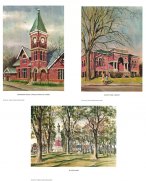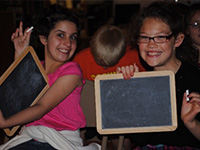
|
News at MCLHR
April 25 History Program: "Shop Talk: History & Memories of the Milwaukee Road Shops in Tomah" The Monroe County Local History Room & Museum presents: “Shop Talk: History & Memories of the Milwaukee Road Shops in Tomah,” a public program to be held on Thursday, April 25th at 7pm at the Sparta United Methodist Church... Click here for more
History Room closed Jan. 16-22. Reopens Jan. 23.
|
A Travel Through Time: A Day in the Life of a Kid in 1880"Title: "A Travel Through Time: A Day in the Life of a Kid in 1880"
Goals:
Social Studies Performance Standards Related to the Program Grade 4 A.4.7 Identify connections between the local community and other places in Wisconsin, the United States, and the world B.4.1 Identify and examine various sources of information that are used for constructing an understanding of the past, such as artifacts, documents, letters, diaries, maps, textbooks, photos, paintings, architecture, oral presentations, graphs and charts B.4.4 Compare and contrast changes in contemporary life with life in the past by looking at social, economic, political, and cultural roles played by individuals and groups B.4.8 Compare past and present technologies related to energy, transportation, and communications and describe the effects of technological change, either beneficial or harmful, on people and the environment B.4.9 Describe examples of cooperation and interdependence among individuals, groups, and nations C.4.3 Explain how families, schools, and other groups develop, enforce, and change rules of behavior and explain how various behaviors promote or hinder cooperation E.4.3 Describe how families are alike and different, comparing characteristics such as size, hobbies, celebrations, where families lives, and how they make a living E.4.5 Identify and describe institutions such as school, church, police, and family and describe their contributions to the well being of the community, state, nation, and global society
Physical Education Performance Standards Related to the Program 5:2:A1 Accepts the teacher's decision regarding a personal rule infraction without displaying negative reactions toward others. 5:2:A2 Assesses and takes responsibility for his or her own behavior without blaming others. 5:2:A3 Demonstrates safe control of body and equipment. 5:2:A4 Follows class, activity, or game rules respectfully. 5:2:B1 Cooperates with all class members by taking turns and sharing equipment. 5:2:B2 Participates in a variety of team building activities. 5:2:B7 Participates in low-level challenges, team building, adventure, and cooperative activities that encourage working together to solve problems in a game or activity. 5:2:B8 Regularly encourages others and refrains from negative statements.
Common Core State Standards for Literacy in All Subjects (K-5) Related to the Program SL.3.1b Follow agreed-upon rules for discussions (e.g., gaining the floor in respectful ways, listening to others with care, speaking one at a time about the topics and texts under discussion). SL.3.1c Ask questions to check understanding of information presented, stay on topic, and link their comments to the remarks of others. SL.3.1d Explain their own ideas and understanding in light of the discussion. SL.3.3 Ask and answer questions about information from a speaker, offering appropriate elaboration and detail.
|
||
200 W. Main St., Sparta, WI 54656 | Phone: (608) 269-8680 | Email: MCLHR@centurytel.net | Visit Us On Facebook
Website development by Webteam, Inc.

